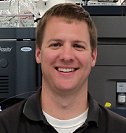 |
J. Will Thompson, Ph.D., received his Ph.D. in Ultrahigh Pressure Liquid Chromatography from the laboratory of Dr. Jim Jorgenson at the University of North Carolina at Chapel Hill. He later joined the Disease and Biomarker Proteomics group led by Dr. Arthur Moseley at GlaxoSmithKline and in 2007 assisted Dr. Moseley in founding the Duke Proteomics Core Facility, which is organized under the Duke School of Medicine and now employs seven scientists. The Duke Proteomics Core specializes in high-accuracy label-free differential expression proteomics. Dr. Thompson’s research in part focuses on development of novel approaches for isolation and quantitation of post-translational modifications on a proteome scale. The Core has completed over 300 projects for 100+ principal investigators since 2007, and works with investigators both inside and outside the Duke School of Medicine.
Using Skyline to Monitor Long-Term Performance Metrics of High-Resolution Mass SpectrometersThe critical role that proper system suitability and performance metrics tracking can play with respect to obtaining reproducible proteomics results has recently become more appreciated in the proteomics community. Obstacles to implementation of a system suitability practice in a proteomics environment include selection of an appropriate sample, method, and software to analyze and store the data. Our laboratory has been utilizing a low-level (50 fmol) injection of a single protein protein digest (ADH1_YEAST, Waters MassPrep) to monitor system suitability of QToF mass spectrometers over the past four years. Typically the standard is analyzed prior to any sample set and after tuning/calibration. Starting in the summer of 2011, we implemented a full-scan MS2 method monitoring 7 specific peptides across the gradient space, and have used Skyline to load and visualize the raw data, paying specific attention to retention time reproducibility, chromatographic peak shape, peak intensity, and MS2 fragmentation. We have found these metrics to be a more sensitive indicator of instrument performance than sequence coverage or mass accuracy from a database search. In this presentation, I will discuss the overall importance and methods for implementing system suitability on high resolution mass spectrometers using Skyline.[PDF] [PowerPoint] |